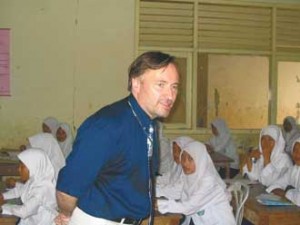
Historic ties to Islamic community and scholarship lead to call for help after tsunami struck
By Neale McDevitt
When the western coastal region of Indonesia was hit by a cataclysmic tsunami on Dec. 26, 2004, the shock waves were felt around the world – particularly here at McGill.
The University has strong ties to the world’s largest Islamic country, dating back to the 1950s, when Indonesian scholars began coming here to study at the newly opened Institute of Islamic Studies – which was a rarity at the time.
“It was quite unusual for scholars from the Islamic world to come to Canada to study about their culture and themselves,” said Phil Buckley, a professor of philosophy and the Principal Investigator of McGill’s IAIN Indonesia Social Equity Project (IISEP). “It speaks to the vision of the Islamic Institute itself, which was to understand the richness and variety of Islamic cultures from a non-normative perspective, as a social science endevour.”
Those same scholars went back home and became quite influential in Indonesian public life. Among other things, they established the State Institutes of Islamic Studies (IAIN) an archipelago-wide system of education basically modeled on McGill’s Institute of Islamic Studies. The mission of IAINs is to promote “critical thought and objective enquiry; understanding of other religions; a participatory, democratic and inclusive approach to development; and respect for the humanistic, tolerant, egalitarian and open traditions of classical Islam.”
When the unthinkable happened, and the huge wave washed away whole communities in a matter of seconds, McGill was there to help pick up the pieces.
The University’s ties to Inonesia had only strengthened over the years, with a continual stream of scholars coming here to study in order to return home and contribute to the IAIN system. In the late 1980s, these ties became more formalized, Buckley explained. “The Canadian International Development Agency (CIDA), with some pushing from the McGill side, realized that this was an interesting way to do development,” he said. “Indonesia is a poor country and to strengthen its institutions and to have capacity building at major institutions is one way to do development – particularly because these institutions tend to be at the apex of the Islamic school system. The effects would trickle down to the primary level of education.”
With CIDA on board, the IISEP project became more structured, with the bulk of the work being focussed on the IAINS at Jakarta and Yogyakarta. The development stream ran in two directions, with McGill bringing young lecturers from these institutions (who often had only an MA) to the University for training. At the same time McGill professors went to Indonesia to help improve the IAINs curriculum, focusing primarily on Islamic studies.
That focus expanded considerably in 2000, when the project entered a new phase to try and establish the institutes at Jakarta and Yogyakartaas as full-fledged universities, said Buckley. “In this phase, our work has been largely outside of Islamic studies – which is why someone like myself is involved. I work in contemporary German philosophy. They wanted someone to teach Western philosophy and I very happily got involved.
“The focus in this phase is on developing the curriculum of Social Sciences and Humanities, Math and Science education – so we’ve had a number of Indonesian students go through the faculty of Education and the School of Social Work” Buckley continued. “It marks a real broadening of McGill’s co-operation.”
Then disaster struck. Following the tsunami, CIDA approached McGill to take on an additional project to help rebuild the IAIN in Aceh, one of the hardest hit regions. Again, the McGill connections are strong at the Aceh school, where 11 graduates work including one who died when the tsunami hit. “We were a natural choice for this project,” Buckley said, “because our long-standing relationship has fostered a fair amount of trust and confidence.”
With the work in Jakarta and Yogyakarta winding down, the IISEP team has been able to devote most of its efforts in helping reconstruction and rehabilitation in Aceh. With the IAIN up and running again, new academic programs are being established and links with the community are being strengthened.
“I believe our work in Aceh has been quite successful because we very intimate links with this institution,” Buckley said. “I think a number of other agencies were a little more distant from the local culture because they just don’t have the same ties to the area as we do. People there know us and trust us.”
With such a rich history, it is no surprise that Buckley speaks of many new collaborative endeavours between McGill and Indonesia: “I am confident McGill will continue to play a central role in the development of higher education in this huge and important country.”
